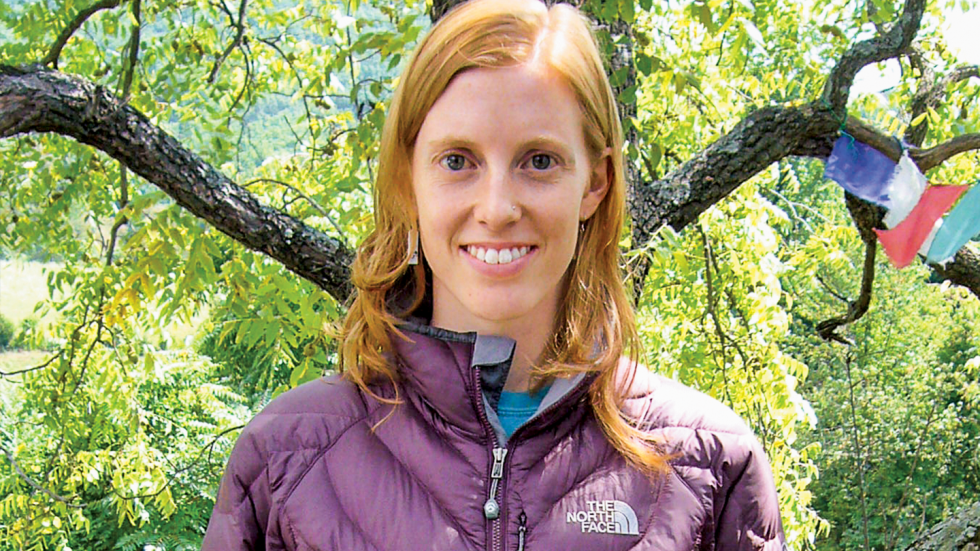The Making of Sean M. Decatur
Biochemist and Beatles aficionado, Kenyon's new president grew up with the lessons of learning.
Read The StoryKate Tully '04 leads research on improving food production without harming the environment.

“Biogeochemist” is a formidable term. Not for Kate Tully ’04, who bears the title with enthusiasm and gives a straightforward definition: the study of “how people interact with the environment through chemistry.”
The real draw, though, is how she gets to interact with people, whether they’re fellow scientists or farmers in sub-Saharan Africa. “You don’t do this kind of work if you don’t like people and don’t want to see them thrive,” she said.
Tully is a postdoctoral fellow in the Agriculture and Food Security Center at Columbia University’s Earth Institute. Through its partnership with the Millennium Villages Project, she works with researchers, business leaders, humanitarians, and, more importantly, the diverse peoples of Africa to assist in community-led approaches to sustainable development.
The partnership’s work is affected in many ways by the Alliance for a Green Revolution in Africa (AGRA), a movement to reduce poverty and malnutrition that began in 2006 and resembles twentieth-century green revolutions in South America and Asia. Among its widespread initiatives, AGRA is encouraging farmers to increase their fertilizer use sixfold by 2015.
Tully and the team she manages conduct research on controlled maize farms near villages in Sauri, Kenya, and Mbola, Tanzania, to quantify the nitrogen losses from farms receiving different levels of fertilizer. Their work will provide data on how to balance a need to increase food production and minimize environmental impacts.
The other part of her work—her favorite part—takes her out into the region’s villages, where she talks to farmers about their own land management practices and studies how these affect yields and soil quality. “We can learn a lot on our controlled field trials, but ‘real farms’ can respond differently,” she said, “and the real world is what it’s all about.”
The point of it all is to help fill an enormous void of scientific data about Africa, where soil types and local cultures can widely vary, and to “make the African green revolution more ‘green’—in other words, more sustainable—and not to repeat previous mistakes,” Tully said. (Critics of earlier green revolutions cite detriments to biodiversity, nutritional quality of crops, and social parity, among other issues.)
Tully, who first discovered Kenyon as a high school student at the summer Young Writers Workshop, became an English and Spanish double-major. But she added a minor in biology after a sophomore-year environmental studies course with Professor of Biology Siobhan Fennessy led her to see “the intersection of science and people and the environment in entirely new ways.” She pursued off-campus study in Costa Rica and graduated with her sights set on more science.
Graduate work at the University of Virginia took her back to Costa Rica, where she researched shade-grown coffee farms in the Central Valley and described the critical role that trees can play in preventing nutrient loss from cultivated soils. As with her current experiences in Africa, Tully was struck by the variability in soils, ecosystems, and even human systems.
“Initially the variability made it hard for me to pitch my dissertation,” she said. “I had to explain that this wasn’t a controlled study, but yeah, life’s messy. If a pattern persists despite the variation, that’s a really strong signal. The whole point is, people are interacting, intentionally and unintentionally, with the environment through chemistry, and that’s going to be complex. We’re going to control what variables we can and then try to answer some really difficult questions.”
Biochemist and Beatles aficionado, Kenyon's new president grew up with the lessons of learning.
Read The StoryDiscovering Danville's famous raccoon dinner, a Kenyon student muses on socio-culinary boundaries and the people…
Read The StoryKenyon's first females graduated forty years ago. To mark the occasion, the Bulletin recalls how coeducation came…
Read The StoryAn immensely complex transplant operation gives a soldier two new limbs. On the team that made it happen: a husband…
Read The Story